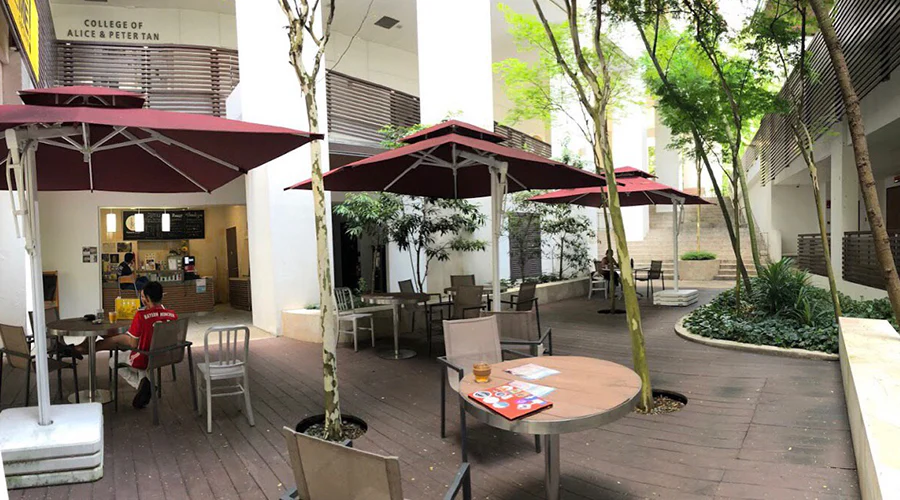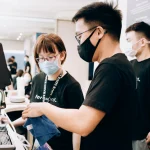In the short two years running Foreword Coffee, I’ve met with many job coaches and feel that they play a very important role to help persons with disabilities and special needs find a place in our society.
My first contact with a job coach was when the company partnered Cerebral Palsy Alliance School Singapore (CPASS) to provide work attachment for two of their students at our cafe. Foreword Coffee was situated within National University of Singapore (NUS) University Town (UTown) back then, and our cafe was just a humble space with alfresco seating.

One of the last few pictures for keepsakes, before we moved out (May 2018)
That was my first experience working with students from CPASS and I did not know what to expect; I just wanted to make use of the space I had to provide learning opportunities for both the students and myself. Twice a week for two months, Kim* — a job coach — would bring her students to the cafe, observe how they work, and make respectful suggestions on how they can improve by making adjustments at the workplace.
There were times when I was tearing my hair out of my head when one of the students just could not properly pour milk from a bottle into a jug on a weighing scale. I noticed my heartbeat start to race and my voice got louder and louder as I practised with the student the same action of pouring water into a jug, over and over again. Kim was observing from afar and interfering at times when I was exhausted, trying different ways of teaching so that the student understood what was expected from her and to practice executing the action.
Just when I thought the student would never be able to consistently pour milk into the jug (with the desired weight), she finally did it for the first time.
“Wow! You did it!” I exclaimed. Kim explained that she made the student practise back at school, so that she is able to understand and execute her task at work.

The task was simple, to pour water to a weight of 240g. How difficult can it be?
Today, one of the students — Rachael — is currently working at our cafe. We saw her through the work attachment, accepted her into a 6-months internship stint, and then employed her when she graduated from the school. We are still working closely with her current job coach to make things easier for her at the workplace, leveraging on tools and technology that also help to make things easier for everyone at the cafe.
Several months into running the cafe at NUS, I enquired for employment support via SG Enable and got referred to a job coach. I was looking for help at that time because I needed assistance to smoothen the relationship between two employees: one who is Deaf and another who has autism. The Deaf employee was my first hire and the latter was my second. I was facing difficulties working in between them as a mediator over the past 2 months; it seemed they were fine working with me as a three-man team, but not when they were both together as a duo.
Although my autistic employee recently graduated from a reputable SPED (special education) school, he was without a job coach to help him enter the workforce which made it very difficult for me, the employer, to get the help needed to better understand him and to include him into the workplace. Ken*, the job coach of my Deaf employee, dropped by the cafe for a chat with me. With the help of his colleague, who is Deaf and a sign interpreter, the 4 of us chatted, and I learnt that the 3 of them have known each other for a long time. They shared with me what my Deaf employee wanted to tell me (I was still new to sign language back then and it was very effortful to understand / communicate with the Deaf).

Celebrating the birthday (and farewell) of our first employee and strong advocate for the Deaf community. Thank you Jimmy (second from right) for teaching me sign language and inspired me to also include the Deaf into our company’s social mission to empower the differently-abled.
Through Ken, he introduced suitable Deaf clients to us when we were preparing for a new outlet at Buona Vista (back in July 2018) and needed someone with experience to help us lead a team. It was a successful job match as the client — now our manager at the Buona Vista outlet — had years of experience in the F&B industry. Leena, our outlet manager, assumed the role with confidence while giving us feedback on how to improve the cafe workflow, and we continue to learn from each other as we communicate openly on matters regarding the cafe.
Our most recent special hire was a graduate from Rainbow Centre. I remember myself conducting interviews for 4 boys. They vary in conditions from autism to hemiplegia. I knew that I was not looking for the “best” candidate; I always feel that persons with special needs who are deemed capable enough to be hired by regular companies should go for it, while social enterprises can be there to “fill in the gaps”. As such, I was highly impressed by a boy with moderate autism and his ability to count money and to hold very simple conversations, although it sounded slightly robotic.
His job coaches, El* and WX*, immediately started the School-to-Work (S2W) transition planning for him as soon as we made the decision to employ the boy. Both El and WX were very attentive to our cafe’s needs and collected information from me to make sure that our new boy’s first day at work will not be threatening to him. They also created visual aids and went through with the boy the expectations and requirements from him at work.

Communication cards to help our boy with autism to communicate with his Deaf manager.
This case has since been passed on to a new job coach, Sue*, to take care of our boy for the year ahead, and she continues to provide support to ensure the successful integration of the boy into our workplace.
In a focus group discussion held some weeks back, Foreword Coffee was given the opportunity to participate and share what we thought is necessary for the disability / special needs scene in Singapore, from an employer’s point of view. I firmly believe that job coaches play a pivotal role between the person with special needs or disabilities and the employer.
Employers expect employees to “plug and play”; the employee should be able to perform immediately at work with minimal guidance. For PWDs, however, there are many barriers to be overcome before successful integration can take place at work. Barriers could be physical (e.g. narrow corridors making it impossible for wheelchair users to pass through) or attitudinal (e.g. stigma and prejudice which colleagues might have towards the employee with special needs); barriers could also be due to (the lack of) communication (e.g. lack of subtitles or caption for persons who are deaf / hard of hearing to understand what is on the video) or systemic (e.g. job application forms requiring applicants to state their disability).
Job coaches play an important role, balancing the fine relationships between parent, child (the client), and the employer. Towards their clients, they teach, coach, provide a listening ear, and a pillar for emotional support; towards the parents of their clients, they have to reassure, encourage, and advise them on things parents could do at home to help their child perform better at work; at the workplace, job coaches conduct job analysis, advise on job redesigning, and provide job training and support. Having said this, employers need to be aware that job coaches are not their employees and should not expect them to perform the tasks which their employees should do; the goal of job coaches is to eventually fade out from the workplace so that their clients can be independent at work.
In celebration of World Autism Day, I would like to thank all the job coaches who have worked with Foreword Coffee. You know who you are, and we truly appreciate the support you continuously give towards your clients — our employees — to help them enjoy their work and lead independent lives.

❤ our ever-growing Foreword Coffee team 😉





